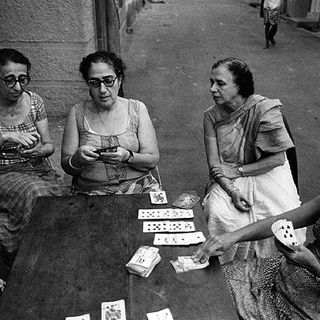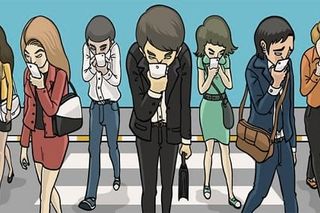
Have You Been Phubbing People?
The trend of ignoring people for your phone is an annoying, and damaging, part of the 21st century.

In a world filled with the instant gratification of social media and easily accessible information through our smartphones, it’s probable that you’ve phubbed someone before. Maybe you’re even doing it right now.
“Phubbing” or phone snubbing, happens when you’re in the presence of other people, but you’re too busy looking down at your phone to give them your full attention. It’s become such a normal part of our everyday lives that we probably don’t even realize we’re doing it.
The term was coined in May 2012 by an Australian ad agency who wanted to find a word that described a key phenomenon of our times. While the term may still be new to some people, the action definitely isn’t. Chances are, we’ve all been phubbers and phubbees, with studies suggesting that more than 17 percent of people phub others a minimum of four times a day, and 32 percent reporting being phubbed more than twice a day.
To be fair, the word and the action it describes don’t seem like such a big deal, right? It’s perfectly normal for people to be scrolling through Twitter or replying to a text while they’re with someone else. Does it really matter, especially if everyone else is also busy doing it, too? But the effects of phubbing go deeper than we might appreciate, affecting our own self-esteem, feelings of social exclusion, frustration, and depression. It can have a negative impact on people’s mental health and can cause conflict in relationships, by adding to already underlying problems.
Related on The Swaddle:
German Kids Are Protesting Their Parents’ Smartphone Use
Several studies published during the past few years show just how harmful phubbing actually is. A paperpublished in the Journal of Applied Social Psychology showed that people who were being phubbed as part of a simulated conversation felt more unsatisfied and negative towards the interaction than people who experienced the same conversation without being phubbed. The study authors found that phubbing is a threat to our “fundamental needs,” such as a sense of belonging, meaningful existence, and our self-worth. When someone is phubbed, they may feel like they have been rejected, excluded, and like they are insignificant, which has a major impact on mental health.
People having conversations while being phubbed reported less satisfaction and a feeling of disrespect from the other person. Another study found that phubbing during meals with friends and family resulted in all parties enjoying the meal less and feeling less engaged with others. And just the presence of a cell phone that is out and visible during a conversation, even if it wasn’t being actively used, was enough to make people feel less connected to each other.
The most common relationship in which one person phubs the other is a romantic relationship. In a study of 145 participants, ironically called, “My life has become a major distraction from my cell phone,” researchers found that phubbing decreased marital satisfaction and contributed to higher levels of anxiety and depression. Chinese researchers conducted a follow-up study with 243 married adults and also concluded that partner-phubbing has a direct, negative effect on marital satisfaction, relationship length, and is “a significant risk factor for depression.”
It’s ironic that smartphones, designed to foster a sense of connectedness and closeness with the people in our lives, are actually impeding relationships and creating an atmosphere of social exclusion. Having a conversation with a person, face-to-face, involves a lot more than simply hearing what they’re saying — it means being attuned to the nuances of tone, facial expression, and body language. But unfortunately, with our culture of phubbing, we’re losing our ability to empathetically communicate with each other.
Phubbing is more about impulse control than anything else, so it might be a good idea to create some boundaries once in a while. For example, a no-phone rule during meal times, turning off notifications after a certain time, or turning on your phone’s grayscale to make those colorful apps a little less tempting, may help curb phone usage. Because the people irl (in real life) deserve as much attention as the ones on your screen.
Nadia Nooreyezdan is The Swaddle's culture editor. Since graduating from Columbia Journalism School, she spends her time thinking about aliens, cyborgs, and social justice sci-fi. She's also working on a memoir about her family's journey from Iran to India.
Related


Timing Is Everything When Switching School Boards
